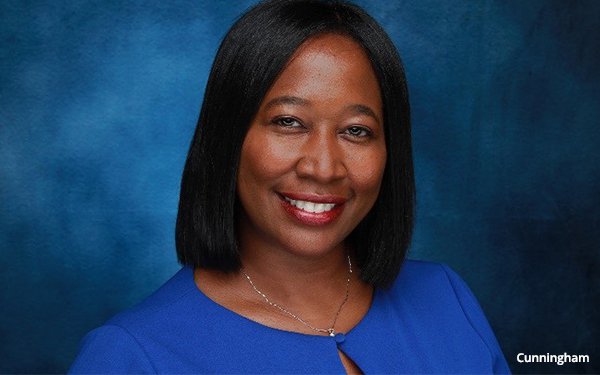
Jennifer Cunningham’s tenure as editor in
chief of Newsweek started at almost exactly the same time as Donald Trump’s second term as president. Cunningham is now trying to help readers cope with the
“oversaturation of breaking news” relating to Trump and every other subject.
Cunningham comes to this role after almost a year as executive editor
at Newsweek, and a prior stint as editor in chief of Business Insider’s news division. She stepped into her new job when her boss and mentor Nancy Cooper
retired.
Given the chaos and noise in today’s news cycle, Cunningham’s biggest challenge is “one that is really something that many newsrooms are
grappling with: how legacy publications build trust and in some cases regain trust,” she says.
advertisement
advertisement
To that end, Newsweek now has a “Fairness Meter,” in which
readers can easily rate stories. In the early days, more than 2 million votes were cast, 70% of which were voted stories to be fair. And in January, Newsweek joined The Trust Project, a
global initiative to support trustworthy journalism, made up of almost 300 news organizations.
Attaining that level of trust is based upon careful due diligence.
“We take fact checking seriously,” Cunningham says. “Obviously, the reporter is first line of defense, but we have a very robust system with a standards team who make sure the
story is up to scratch. We have a strong copy editing team, flagging inconsistencies.”
That raises the question: Just what is Newsweek’s political stance? You might say it
has none. “Our readership skews 33%, 33% and 33% – Democrats, Republicans and Independents.” Cunningham explains.
She adds, “Our mission is
neither fear nor favor. We don’t aim to be adversarial with the administration, but we’re also not adulating. We’re there to cover him accurately, fairly, objectively with the same
vigor and intensity that we did with the Biden administration.”
That takes a heap of reporting in different formats. Newsweek offers newsletters, podcasts, a
weekly print magazine and daily news. The old second-day story is now the second-hour story, as Cunningham puts it. Above all, stories must be nuanced.
“There’s an old saying
that content is king, but I believe that context is king,” Cunningham says.
She observes that readers are “increasingly looking to Newsweek to help
make sense of all of this news.”
Newsweek has a 24/7 team, ranging from reporters on the West Coast to the London bureau on Canary Wharf. How many people are on staff?
“Soaking wet, a little more than 100,” Cunningham laughs.
It seems to be working. Newsweek is profitable, and traffic has grown
35% in the last two years from 33 million to 45 million users per month. Of course, like other publications, it has had to do “modest restructuring as business needs have evolved.
It’s something that hasn’t interrupted operations.”
At present, Newsweek has no paywalls. “That’s not to say we may not have them
in the future,” Cunningham points out. “As with all decisions, we want to make an informed decision.”
But back to the newsroom. What does Cunningham
look for in a reporter? It takes more than just a J school degree.
“J school teaches you a lot things – I’m a product of J School – but there are some things
only the school of life teaches you,” she notes.
To Cunningham, the perfect reporter is someone who is “naturally curious, almost burrowing into other
people’s lives.”
As for writing, “I’m honestly much more excited by somebody who is nimble at reporting. The writing part is easy – I can
write in 15 or 20 minutes if I have the reporting done.”
It also probably helps if the reporter is comfortable with AI, a tool for which Newsweek provides rigorous training.
“AI is something we are not only thinking about every day, but putting some actionable steps around. Newsweek was an early adopter of ethical artificial intelligence
integration.”
Cunningham calls AI “a bicycle for the mind.” It frees reporters from administrative tasks, and allows them to spend more time chasing down
stories. Of course, it must be done with full transparency and cannot be used to write stories.
This is not about robots writing stories. AI cannot capture the
“look on a defendant’s face when a judge finds them innocent,” Cunningham adds.
How does the new chief manage things?
“My
management style is to have an open door policy and to be a nurturing leader, and I think the staff is responsive to that,” she says.
What’s next at
Newsweek?
“You’ll see more video coming from us on our web site this year, and also some new offerings and bells and whistles in the
magazine.”
In the end, Cunningham favors the type of journalist who, like her, is willing to expend shoe leather. She particularly loved covering the federal courts,
where there are no cameras allowed. And she makes this observation about the profession: “In some respects, it’s not just a career, it’s a lifestyle, and
either you have it or you don’t."